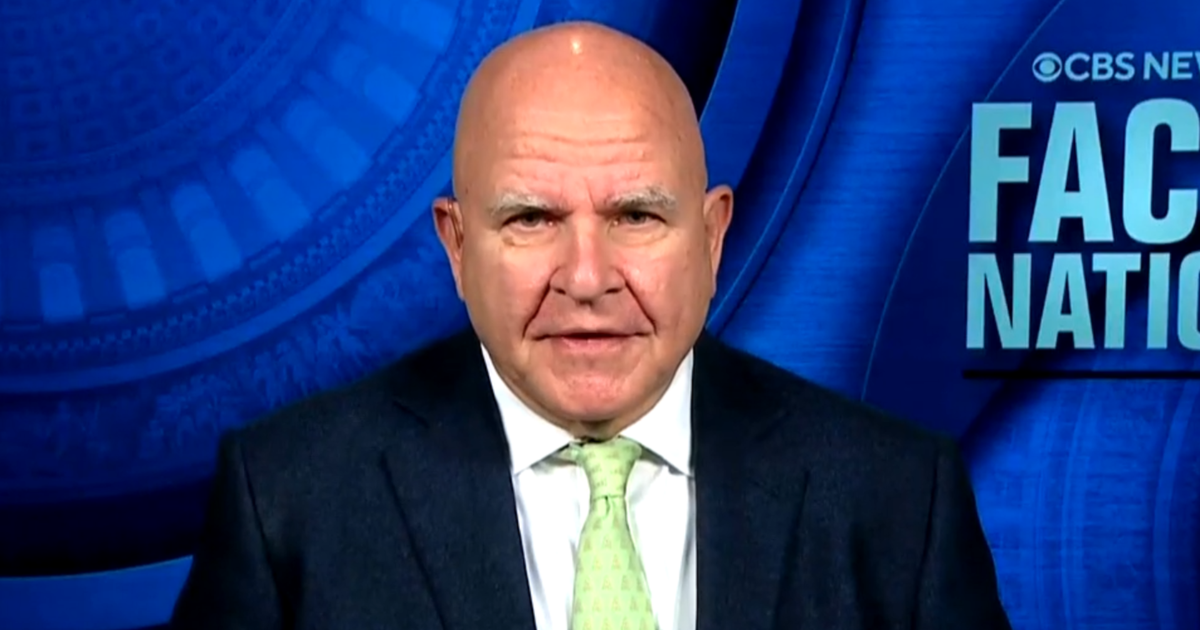CBS News
House approves bill renewing FISA spy program after GOP upheaval threatened passage

Washington — The House on Friday passed a bill to reauthorize a crucial national security surveillance program, two days after a conservative revolt prevented similar legislation from reaching the floor.
The bill reforms and extends a portion of the Foreign Intelligence Surveillance Act known as Section 702 for a shortened period of two years, instead of the full five-year reauthorization first proposed. The change was made to sway GOP critics.
The vote on final passage was 273 in favor to 147 opposed.
Skepticism of the government’s spy powers has grown dramatically in recent years, particularly on the right. Republicans have clashed for months over what a legislative overhaul of the FISA surveillance program should look like, creating divisions that spilled onto the House floor this week as 19 Republicans broke with their party to prevent the bill from coming up for a vote.
However, some of the original opponents signaled their support for the new plan late Thursday.
“The two-year timeframe is a much better landing spot because it gives us two years to see if any of this works rather than kicking it out five years,” said Rep. Chip Roy, a Texas Republican. “They say these reforms are going to work. Well, I guess we’ll find out.”
The fight over FISA
The legislation in question would permit the U.S. government to collect, without a warrant, the communications of non-Americans located outside the country to gather foreign intelligence. The reauthorization is tied to a series of reforms aimed at satisfying critics who complained of civil liberties violations against Americans.
But far-right opponents have complained that those changes did not go far enough. Among the detractors were some of Johnson’s harshest critics, members of the ultra-conservative House Freedom Caucus, who have railed against the speaker the last several months for reaching across the aisle to carry out the basic functions of the government.
To appease some of those critics, House Speaker Mike Johnson, a Louisiana Republican, plans to bring forward next week a separate proposal that would close a loophole that allows U.S. officials to collect data on Americans from big tech companies without a warrant.
“All of that added up to something that I think gave a greater deal of comfort,” Roy said.
Though the program is technically set to expire April 19, the Biden administration has said it expects its authority to collect intelligence to remain operational for at least another year, thanks to an opinion earlier this month from the Foreign Intelligence Surveillance Court, which receives surveillance applications. But officials say that court approval shouldn’t be a substitute for congressional authorization, especially since communications companies could cease cooperation with the government.
First authorized in 2008, the spy tool has been renewed several times since then as U.S. officials see it as crucial in disrupting terror attacks, cyber intrusions and foreign espionage. It has also produced intelligence that the U.S. has relied on for specific operations.
But the administration’s efforts to secure reauthorization of the program have repeatedly encountered fierce, and bipartisan, pushback, with Democrats like Sen. Ron Wyden of Oregon who have long championed civil liberties aligning with Republican supporters of former President Donald Trump, who in a post on Truth Social on Wednesday stated incorrectly that Section 702 had been used to spy on his presidential campaign.
“Kill FISA,” Trump wrote in all capital letters. “It was illegally used against me, and many others. They spied on my campaign.” A former adviser to his 2016 presidential campaign was targeted for surveillance over potential ties to Russia under a different section of the law.
A specific area of concern for lawmakers is the FBI’s use of the vast intelligence repository to search for information about Americans and others in the U.S. Though the surveillance program only targets non-Americans in other countries, it also collects communications of Americans when they are in contact with those targeted foreigners.
In the past year, U.S. officials have revealed a series of abuses and mistakes by FBI analysts in improperly querying the intelligence repository for information about Americans or others in the U.S., including about a member of Congress and participants in the racial justice protests of 2020 and the Jan. 6, 2021, riot at the U.S. Capitol.
Those violations have led to demands for the FBI to have a warrant before conducting database queries on Americans, which FBI director Chris Wray has warned would effectively gut the program’s effectiveness and would also be legally unnecessary given that the information in the database has already been lawfully collected.
“While it is imperative that we ensure this critical authority of 702 does not lapse, we also must not undercut the effectiveness of this essential tool with a warrant requirement or some similar restriction, paralyzing our ability to tackle fast-moving threats,” Wray said in a speech Tuesday.
An amendment that would have required officials to obtain a warrant before searching Americans’ communications in the 702 database failed in a dramatic tie vote before the bill came up for final passage.
CBS News
Former Israeli hostages released in truce 1 year ago call for action to release those still held

Former Israeli hostages who were freed from Hamas captivity during a week-long humanitarian pause in fighting exactly one year ago Sunday called for immediate action to secure a deal for the release of those still held.
The only truce in the ongoing Israel-Hamas war on Nov. 24, 2023 – fewer than two months after fighting began – led to the release of 80 Israelis held by militants in Gaza. They were freed in exchange for 240 Palestinians detained in Israeli jails.
Repeated efforts since then by mediators from Qatar, Egypt and the United States to secure another truce and hostage release have failed. Qatar early this month said it was suspending its mediation role until the warring sides show “seriousness.”
Mostafa Alkharouf/Anadolu via Getty Images
Gabriella Leimberg was kidnapped during the Oct. 7, 2023, Hamas attack and was released along with her daughter, Mia, and sister Clara.
“For 53 days, the one thing that kept me going is that we, the people of Israel, the Jewish people, sanctify life — we don’t leave anyone behind,” she said.
Leimberg added: “Everything has already been said and now action is required. We don’t have any more time.”
Around 100 hostages are still in Gaza, and at least a third are believed to be dead.
“I survived and I was fortunate to get my entire family back,” Leimberg said. “I want and demand this for all the families of the hostages.”
Hamas wants Israel to end the war and withdraw all troops from Gaza. Israel has offered only to pause its offensive.
The Palestinian death toll from the war surpassed 44,000 this week, according to Gaza’s Health Ministry, which does not distinguish between civilians and combatants in its count.
Maya Alleruzzo / AP
Danielle Aloni, who was kidnapped with her five-year-old daughter, Emelia, and freed after 49 days, spoke at the ceremony of the “increasing danger” those still being held face every day.
She said those still in captivity “suffer physical, sexual, and psychological abuse, their identity and dignity crushed anew each day”.
“It took the Israeli government about two months to secure a deal for me and 80 other Israeli hostages. Why is it taking over a year to reach another deal to free them from this hell?” asked Aloni, whose brother-in-law, David Cunio, and his brother, Ariel Cunio, are still being held.
She emphasized that, even though she and the other hostages gained their freedom a year ago, “we haven’t really left the tunnels,” — referring to Hamas’ underground tunnels where many of the hostages were held.
“The feeling of suffocation, the terrible humidity, the stench — these sensations still envelop us,” Aloni said.
“If people could truly understand what it means to be held in subhuman conditions in tunnels, surrounded by terrorists for 54 days — there’s no way they would allow hostages to remain there for 415 days!” said Raz Ben Ami, who was released in the deal a year ago.
Her husband, Ohad, is still among those being held.
Ben Ami called for a ceasefire to “bring back all the hostages as quickly as possible”.
CBS News
Couple charged for allegedly stealing $1 million from Lululemon in convoluted retail theft scheme

A couple from Connecticut faces charges for allegedly taking part in an intricate retail theft operation targeting the apparel company Lululemon that may have amounted to $1 million worth of stolen items, according to a criminal complaint.
The couple, Jadion Anthony Richards, 44, and Akwele Nickeisha Lawes-Richards, 45, were arrested Nov. 14 in Woodbury, Minnesota, a suburb of Minneapolis-St. Paul. Richards and Lawes-Richards have been charged with one count each of organized retail theft, which is a felony, the Ramsey County Attorney’s Office said. They are from Danbury, Connecticut.
The alleged operation impacted Lululemon stores in multiple states, including Minnesota.
“Because of the outstanding work of the Roseville Police investigators — including their new Retail Crime Unit — as well as other law enforcement agencies, these individuals accused of this massive retail theft operation have been caught,” a spokesperson for the attorney’s office said in a statement on Nov. 18. “We will do everything in our power to hold these defendants accountable and continue to work with our law enforcement partners and retail merchants to put a stop to retail theft in our community.”
Both Richards and Lawes-Richards have posted bond as of Sunday and agreed to the terms of a court-ordered conditional release, according to the county attorney. For Richards, the court had set bail at $100,000 with conditional release, including weekly check-ins, or $600,000 with unconditional release. For Lawes-Richards, bail was set at $30,000 with conditional release and weekly check-ins or $200,000 with unconditional release. They are scheduled to appear again in court Dec. 16.
Prosecutors had asked for $1 million bond to be placed on each half of the couple, the attorney’s office said.
Richards and Lawes-Richards are accused by authorities of orchestrating a convoluted retail theft scheme that dates back to at least September. Their joint arrests came one day after the couple allegedly set off store alarms while trying to leave a Lululemon in Roseville, Minnesota, and an organized retail crime investigator, identified in charging documents by the initials R.P., recognized them.
The couple were allowed to leave the Roseville store. But the investigator later told an officer who responded to the incident that Richards and Lawes-Richards were seasoned shoplifters, who apparently stole close to $5,000 worth of Lululemon items just that day and were potentially “responsible for hundreds of thousands of dollars in loss to the store across the country,” according to the complaint. That number was eventually estimated by an investigator for the brand to be even higher, with the criminal complaint placing it at as much as $1 million.
Richards and Lawes-Richards allegedly involved other individuals in their shoplifting pursuits, but none were identified by name in the complaint. Authorities said they were able to successfully pull off the thefts by distracting store employees and later committing fraudulent returns with the stolen items at different Lululemon stores.
“Between October 29, 2024 and October 30, 2024, RP documented eight theft incidents in Colorado involving Richards and Lawes-Richards and an unidentified woman,” authorities wrote in the complaint, describing an example of how the operation would allegedly unfold.
“The group worked together using specific organized retail crime tactics such as blocking and distraction of associates to commit large thefts,” the complaint said. “They selected coats and jackets and held them up as if they were looking at them in a manner that blocked the view of staff and other guests while they selected and concealed items. They removed security sensors using a tool of some sort at multiple stores.”
CBS News contacted Lululemon for comment but did not receive an immediate reply.
CBS News
Former Trump national security adviser says next couple months are “really critical” for Ukraine

Washington — Lt. Gen. H.R. McMaster, a former national security adviser to Donald Trump, said Sunday that the upcoming months will be “really critical” in determining the “next phase” of the war in Ukraine as the president-elect is expected to work to force a negotiated settlement when he enters office.
McMaster, a CBS News contributor, said on “Face the Nation with Margaret Brennan” that Russia and Ukraine are both incentivized to make “as many gains on the battlefield as they can before the new Trump administration comes in” as the two countries seek leverage in negotiations.
With an eye toward strengthening Ukraine’s standing before President-elect Donald Trump returns to office in the new year, the Biden administration agreed in recent days to provide anti-personnel land mines for use, while lifting restrictions on Ukraine’s use of U.S.-made longer range missiles to strike within Russian territory. The moves come as Ukraine marked more than 1,000 days since Russia’s invasion in February 2022.
Meanwhile, many of Trump’s key selection for top posts in his administration — Rep. Mike Waltz for national security adviser and Sens. Marco Rubio for secretary of state and JD Vance for Vice President — haven’t been supportive of providing continued assistance to Ukraine, or have advocated for a negotiated end to the war.
CBS News
McMaster said the dynamic is “a real problem” and delivers a “psychological blow to the Ukrainians.”
“Ukrainians are struggling to generate the manpower that they need and to sustain their defensive efforts, and it’s important that they get the weapons they need and the training that they need, but also they have to have the confidence that they can prevail,” he said. “And any sort of messages that we might reduce our aid are quite damaging to them from a moral perspective.”
McMaster said he’s hopeful that Trump’s picks, and the president-elect himself, will “begin to see the quite obvious connections between the war in Ukraine and this axis of aggressors that are doing everything they can to tear down the existing international order.” He cited the North Korean soldiers fighting on European soil in the first major war in Europe since World War II, the efforts China is taking to “sustain Russia’s war-making machine,” and the drones and missiles Iran has provided as part of the broader picture.
“So I think what’s happened is so many people have taken such a myopic view of Ukraine, and they’ve misunderstood Putin’s intentions and how consequential the war is to our interests across the world,” McMaster said.
On Trump’s selections for top national security and defense posts, McMaster stressed the importance of the Senate’s advice and consent role in making sure “the best people are in those positions.”
McMaster outlined that based on his experience, Trump listens to advice and learns from those around him. And he argued that the nominees for director of national intelligence and defense secretary should be asked key questions like how they will “reconcile peace through strength,” and what they think “motivates, drives and constrains” Russian President Vladimir Putin.
Trump has tapped former Rep. Tulsi Gabbard to be director of national intelligence, who has been criticized for her views on Russia and other U.S. adversaries. McMaster said Sunday that Gabbard has a “fundamental misunderstanding” about what motivates Putin.
More broadly, McMaster said he “can’t understand” the Republicans who “tend to parrot Vladimir Putin’s talking points,” saying “they’ve got to disabuse themselves of this strange affection for Vladimir Putin.”
Meanwhile, when asked about Trump’s recent selection of Sebastian Gorka as senior director for counterterrorism and deputy assistant to the president, McMaster said he doesn’t think Gorka is a good person to advise the president-elect on national security. But he noted that “the president, others who are working with him, will probably determine that pretty quickly.”












